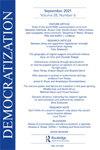toyi toyi需要两个人:在南非2019年全国大选中,一党统治和反对党失败
IF 2.9
1区 社会学
Q1 POLITICAL SCIENCE
引用次数: 1
摘要
摘要:为什么在治理出现重大失误的情况下,占主导地位的政党仍能在选举中获胜?一党制民主国家的学者倾向于在宏观层面找到解释:操纵规则、控制国家媒体或选择性地向支持者分配利益。其他学者强调种族或宗教身份,而这些身份比政策和表现的考虑更重要。我们采用了南非2019年大选选民决策的多项式回归模型,来探索执政的非洲人国民大会是如何在大规模腐败丑闻和公共服务衰退的情况下获得58%的选票的。我们发现,不满的政府支持者并没有忽视糟糕的表现,但在他们改变投票之前,必须在反对派中找到一个合法的替代方案。否则,他们将退出选民。这使得执政党能够在不断减少的选民中赢得相当大比例的选票。因此,关于是否投票的决定不仅是资源、动员或效率的结果,还植根于执政党和反对党的观念。选民投票率和投票选择密切相关,而不是单独的因果过程。此外,一党继续占据主导地位可能既是反对党失败的结果,也是政府对规则、租金或资源控制的结果。本文章由计算机程序翻译,如有差异,请以英文原文为准。
It takes two to toyi-toyi: one party dominance and opposition party failure in South Africa’s 2019 national election
ABSTRACT Why do dominant parties continue to win elections despite significant governance failures? Scholars of one party democracies tend to locate explanations at the macro-level: manipulation of rules, control over state media, or selective distribution of benefits to supporters. Other scholars emphasize ethnic or religious identities which trump consideration of policy and performance. We employ a multinomial regression model of voter decisions in South Africa’s 2019 general election to explore how the ruling African National Congress managed to secure 58% of the vote amidst a massive corruption scandal and waning public services. We find that dissatisfied government supporters do not ignore poor performance, but must perceive a legitimate alternative amongst the opposition before they switch their vote. Otherwise, they exit the electorate. This allows the governing party to win significant proportions of a diminishing electorate. Thus, decisions about whether to vote are not just a result of resources, mobilization or efficacy, but are also rooted in perceptions of governing and opposition parties. Voter turnout and vote choice are intimately linked, rather than separate causal processes. Moreover, continued one-party dominance may be as much a function of opposition party failure as it is of government control over rules, rents or resources.
求助全文
通过发布文献求助,成功后即可免费获取论文全文。
去求助
来源期刊

Democratization
POLITICAL SCIENCE-
CiteScore
6.40
自引率
12.50%
发文量
73
期刊介绍:
Democratization aims to promote a better understanding of democratization - defined as the way democratic norms, institutions and practices evolve and are disseminated both within and across national and cultural boundaries. While the focus is on democratization viewed as a process, the journal also builds on the enduring interest in democracy itself and its analysis. The emphasis is contemporary and the approach comparative, with the publication of scholarly contributions about those areas where democratization is currently attracting considerable attention world-wide.
 求助内容:
求助内容: 应助结果提醒方式:
应助结果提醒方式:


